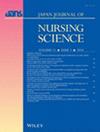Association between social support from workplace supervisors and symptoms of post-traumatic stress disorder among Japanese midwives who experienced trauma during perinatal care
Abstract
Aim
This study examined the association between workplace supervisors' perceptions of social support and the post-traumatic stress disorder (PTSD) symptoms among Japanese midwives who experienced trauma while providing perinatal care.
Methods
We employed a descriptive cross-sectional design and collected data using a self-reported questionnaire. Participants were 144 Japanese midwives working in hospitals. Data were analyzed using descriptive statistics, Spearman's correlation analysis, chi-square tests, and a binomial logistic regression analysis.
Results
Ninety-one midwives had experienced at least one traumatic event in the workplace within the past 12 months. Midwives in the high-PTSD-risk group (Impact of Event Scale–Revised [IES-R] score ≥25) comprised 11% of the sample. The total score of perceived social support from the supervisor was negatively associated with the IES-R total score (r = −0.213, p = .043). Social support from workplace supervisors was not associated with PTSD symptoms when adjusted for midwives experiencing verbal abuse or intimidating behavior from the mother or her family. Although not significant, midwives who had experienced verbal abuse or intimidation from mothers or their families were four times more likely to meet the criteria for the high-PTSD-risk group (odds ratio = 4.188, p = .07).
Conclusions
Perceived social support from workplace supervisors could reduce midwives' PTSD symptoms, but it was not effective for midwives traumatized by verbal abuse or intimidated from expectant mothers or their family members. It is important to establish an organizational and educational system that allows midwives to receive ongoing support from supervisors in the workplace.

 求助内容:
求助内容: 应助结果提醒方式:
应助结果提醒方式:


